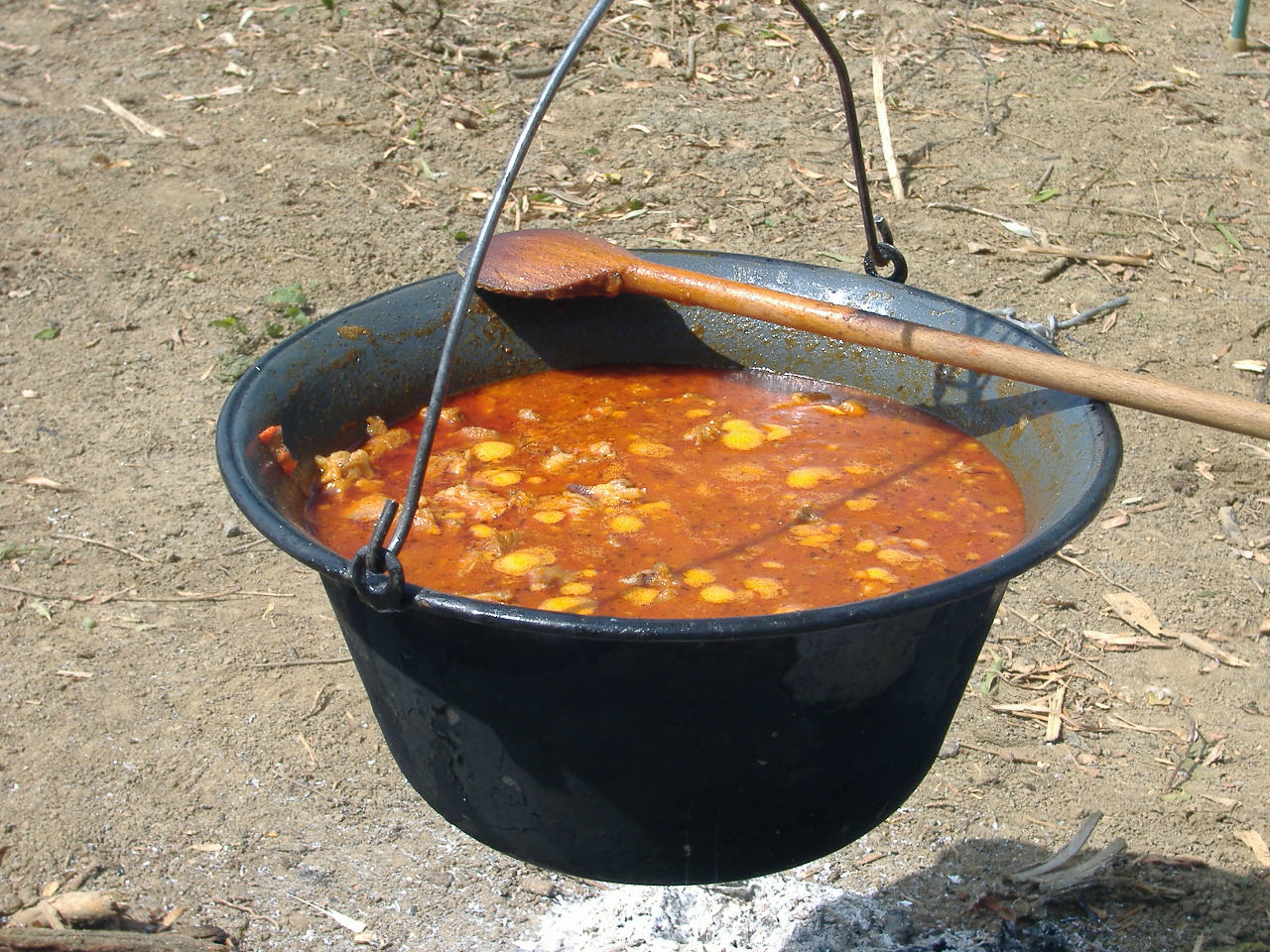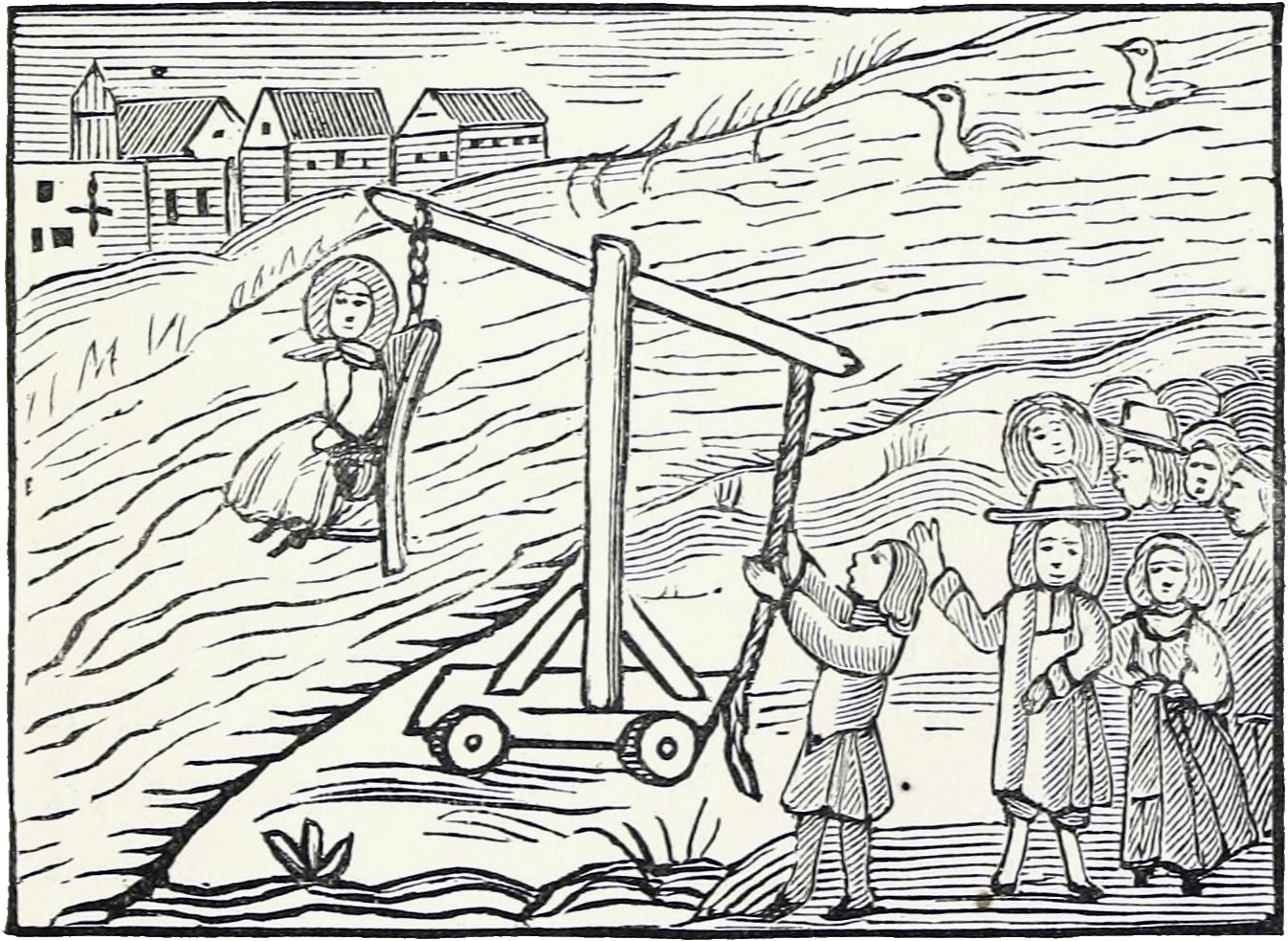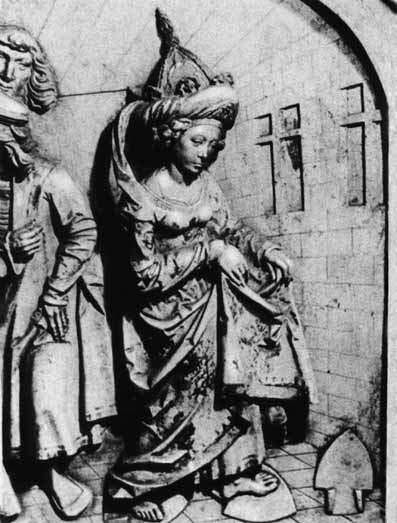|
Alfet
An alfet ( ang, ālfæt, "fire vat") was an ancient cauldron filled with boiling water, into which an accused person was to plunge his arm up to his elbow. Its use was a form of trial by ordeal.Henry Campbell Black, ''Black's Law Dictionary (Second Edition)'' (1910), p. 56. The arm and hand were then bound and left for three days. If the wound was found to have begun to heal cleanly the person was judged to be innocent. However, if the scald was infected or unhealed, the victim was held to be guilty. It was also used for purgation. References * *Charles Dufresne, Sieur Du Cange Charles du Fresne, sieur du Cange (; December 18, 1610 in Amiens – October 23, 1688 in Paris, aged 77), also known simply as Charles Dufresne, was a distinguished French philologist and historian of the Middle Ages and Byzantium. Life Educat ..., ''Glossarium mediæ et infimæ Latinitatis''. 1840–50; 1883–87. Containers Medieval instruments of torture European instruments of torture Trial ... [...More Info...] [...Related Items...] OR: [Wikipedia] [Google] [Baidu] |
Cauldron
A cauldron (or caldron) is a large pot (kettle) for cooking or boiling over an open fire, with a lid and frequently with an arc-shaped hanger and/or integral handles or feet. There is a rich history of cauldron lore in religion, mythology, and folklore. Etymology The word cauldron is first recorded in Middle English as ''caudroun'' (13th century). It was borrowed from Norman ''caudron''T. F. Hoad, ''English Etymology'', Oxford University Press, 1993 (). p. 67. ( Picard ''caudron'', french: chaudron). It represents the phonetical evolution of Vulgar Latin ''*caldario'' for Classical Latin ''caldārium'' "hot bath", that derives from ''cal(i)dus'' "hot". The Norman-French word replaces the Old English ''ċetel'' (German ''(Koch)Kessel'' "cauldron", Dutch ''(kook)ketel'' "cauldron"), Middle English ''chetel''. The word "kettle" is a borrowing of the Old Norse variant ''ketill'' "cauldron". History Cauldrons can be found from the late Bronze Age period - vast cauldrons with ... [...More Info...] [...Related Items...] OR: [Wikipedia] [Google] [Baidu] |
Trial By Ordeal
Trial by ordeal was an ancient judicial practice by which the guilt or innocence of the accused was determined by subjecting them to a painful, or at least an unpleasant, usually dangerous experience. In medieval Europe, like trial by combat, trial by ordeal, such as cruentation, was sometimes considered a "judgement of God" ( la, jūdicium Deī, ang, Godes dōm): a procedure based on the premise that God would help the innocent by performing a miracle on their behalf. The practice has much earlier roots, attested to as far back as the Code of Hammurabi and the Code of Ur-Nammu. In pre-modern society, the ordeal typically ranked along with the oath and witness accounts as the central means by which to reach a judicial verdict. Indeed, the term ''ordeal'', Old English ''ordǣl'', has the meaning of "judgment, verdict" (German ''Urteil'', Dutch ''oordeel''), from Proto-Germanic ''*uzdailiją'' "that which is dealt out". Priestly cooperation in trials by fire and water was forbidd ... [...More Info...] [...Related Items...] OR: [Wikipedia] [Google] [Baidu] |
Henry Campbell Black
Henry Campbell Black (October 17, 1860 – March 19, 1927) was the founder of ''Black's Law Dictionary'', the definitive legal dictionary first published in 1891. Born in Ossining (village), New York, Ossining, New York, he was also the editor of ''The Constitutional Review'' from 1917 until his death in 1927. Books * * **1910 edition free e-book Sources * ''Who Was Who in America. A component volume of Who's Who in American History,'' Volume 1, 1897-1942 (Chicago: A.N. Marquis Co., 1943), page 100 External links * American book publishers (people) People from Ossining, New York 1860 births 1927 deaths {{US-business-bio-1860s-stub ... [...More Info...] [...Related Items...] OR: [Wikipedia] [Google] [Baidu] |
Charles Dufresne, Sieur Du Cange
Charles du Fresne, sieur du Cange (; December 18, 1610 in Amiens – October 23, 1688 in Paris, aged 77), also known simply as Charles Dufresne, was a distinguished French philologist and historian of the Middle Ages and Byzantium. Life Educated by Jesuits, du Cange studied law and practiced for several years before assuming the office of Treasurer of France. Du Cange was a busy, energetic man who pursued historical scholarship alongside his demanding official duties and his role as head of a large family. Du Cange's most important work is his ''Glossarium ad scriptores mediae et infimae Latinitatis'' (Glossary of writers in medieval and late Latin, Paris, 1678, 3 vol.), revised and expanded under various titles, for example, ''Glossarium manuale ad scriptores mediae et infimae Latinitatis'' (Halae, 1772–1784) or from 1840 onward, ''Glossarium mediae et infimae Latinitatis'' (Glossary of medieval and late Latin). This work, together with a glossary of medieval and late Greek ... [...More Info...] [...Related Items...] OR: [Wikipedia] [Google] [Baidu] |
Containers
A container is any receptacle or enclosure for holding a product used in storage, packaging, and transportation, including shipping. Things kept inside of a container are protected on several sides by being inside of its structure. The term is most frequently applied to devices made from materials that are durable and are often partly or completely rigid. A container can also be considered as a basic tool, consisting of any device creating a partially or fully enclosed space that can be used to contain, store, and transport objects or materials. History Humans have used containers for at least 100,000 years, and possibly for millions of years.Clive Gamble, ''Origins and Revolutions: Human Identity in Earliest Prehistory'' (2007), p. 204. The first containers were probably invented for storing food, allowing early humans to preserve more of their food for a longer time, to carry it more easily, and also to protect it from other animals. The development of food storage cont ... [...More Info...] [...Related Items...] OR: [Wikipedia] [Google] [Baidu] |
Medieval Instruments Of Torture
A list of torture methods and devices includes: Psychological torture methods *Being subjected to long periods of interrogation *Blackmailing *Chinese water torture *Exploitation of phobias; e.g., mock execution, leaving arachnophobia, arachnophobes in a room full of spiders *Castor oil#Punishment, Castor oil *Forced nudity *Music torture *Pharmacological torture *Sensory deprivation *Sensory overload *Sleep deprivation *Solitary confinement/Social isolation, Isolation *Threat of permanent, severe disfigurement *Tickle torture *Waterboarding *White torture, White room torture Physical torture methods Instruments of torture Note that the line between "torture method" and "torture device" is often blurred, particularly when a specifically named implement is but one component of a method. Also, many devices that can be used for torture have mainstream uses, completely unrelated to torture. Medieval and early modern instruments of torture Chair of Torture Appearance Th ... [...More Info...] [...Related Items...] OR: [Wikipedia] [Google] [Baidu] |
European Instruments Of Torture
European, or Europeans, or Europeneans, may refer to: In general * ''European'', an adjective referring to something of, from, or related to Europe ** Ethnic groups in Europe ** Demographics of Europe ** European cuisine, the cuisines of Europe and other Western countries * ''European'', an adjective referring to something of, from, or related to the European Union ** Citizenship of the European Union ** Demographics of the European Union In publishing *The European (1953 magazine), ''The European'' (1953 magazine), a far-right cultural and political magazine published 1953–1959 *The European (newspaper), ''The European'' (newspaper), a British weekly newspaper published 1990–1998 *The European (2009 magazine), ''The European'' (2009 magazine), a German magazine first published in September 2009 *''The European Magazine'', a magazine published in London 1782–1826 *''The New European'', a British weekly pop-up newspaper first published in July 2016 Other uses * * Europeans ... [...More Info...] [...Related Items...] OR: [Wikipedia] [Google] [Baidu] |
Trial By Ordeal
Trial by ordeal was an ancient judicial practice by which the guilt or innocence of the accused was determined by subjecting them to a painful, or at least an unpleasant, usually dangerous experience. In medieval Europe, like trial by combat, trial by ordeal, such as cruentation, was sometimes considered a "judgement of God" ( la, jūdicium Deī, ang, Godes dōm): a procedure based on the premise that God would help the innocent by performing a miracle on their behalf. The practice has much earlier roots, attested to as far back as the Code of Hammurabi and the Code of Ur-Nammu. In pre-modern society, the ordeal typically ranked along with the oath and witness accounts as the central means by which to reach a judicial verdict. Indeed, the term ''ordeal'', Old English ''ordǣl'', has the meaning of "judgment, verdict" (German ''Urteil'', Dutch ''oordeel''), from Proto-Germanic ''*uzdailiją'' "that which is dealt out". Priestly cooperation in trials by fire and water was forbidd ... [...More Info...] [...Related Items...] OR: [Wikipedia] [Google] [Baidu] |





